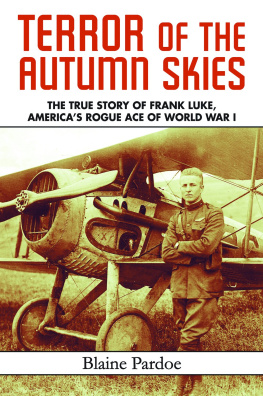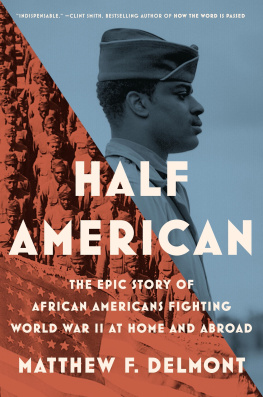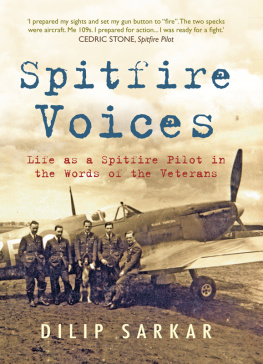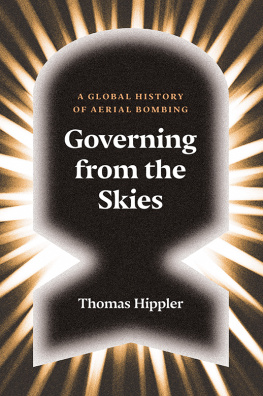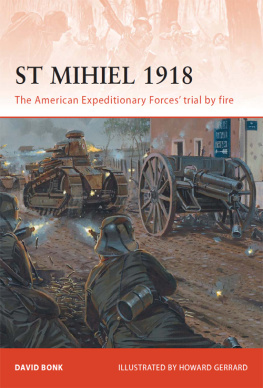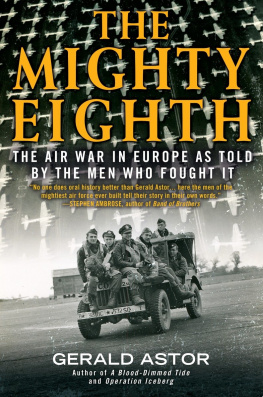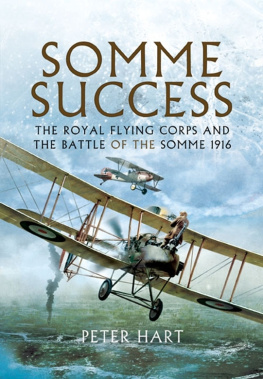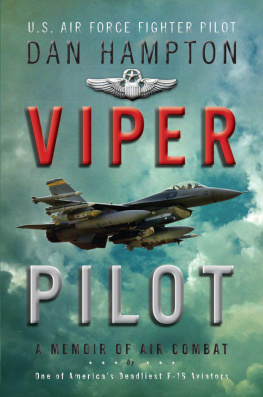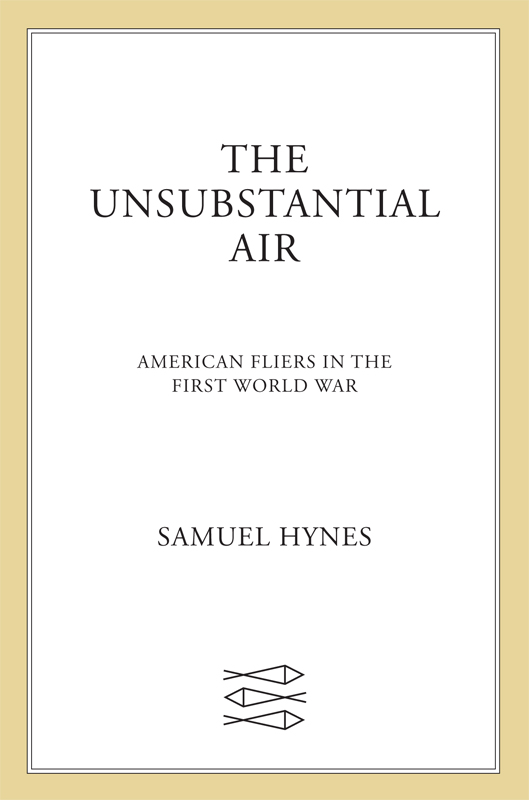Contents
Guide
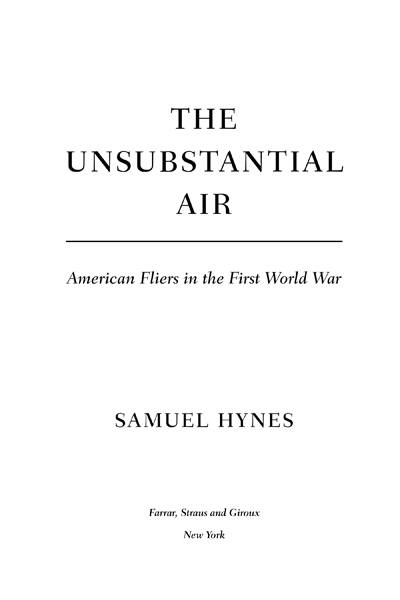
The author and publisher have provided this e-book to you for your personal use only. You may not make this e-book publicly available in any way. Copyright infringement is against the law. If you believe the copy of this e-book you are reading infringes on the authors copyright, please notify the publisher at: us.macmillanusa.com/piracy.
For Susanne McNatt, with gratitude and affection
Welcome, then,
Thou unsubstantial air that I embrace:
The wretch that thou hast blown unto the worst
Owes nothing to thy blasts.
King Lear
CONTENTS
ILLUSTRATIONS
PROLOGUE: A FIRE BEYOND THE HORIZON
A decade after the First World War ended, General William Billy Mitchell looked back on the fighting years and concluded that for the troops on the ground it had not been an interesting war. There was no marching and maneuvering, he wrote, no songs, no flying colors and bands playing while going into action. It was just grovelling in dirty mud holes and being killed and maimed by giant projectiles, or permanently incapacitated by gas. The only interest and romance in this war was in the air.
Romance strikes me as an odd word to come from the man who more than any other American had created the huge destructiveness of massed aerial bombing. But Mitchell was above all a pilot : he loved flying, and planes, and the fighting you could do with them. For him, it was all romantic. Once the cavalry charge with pennons flying had proved suicidal against machine guns, and cavalrymen had been dismounted and turned into infantry, aviation was the only kind of combat left in which one man, mounted on a machine now instead of a horse, could fight a personal war. If the big words of warglory, and honor, and chivalry, and romanceapplied anywhere in this vast conflict, it would be in the air.
To young men in America who heard the news of a European war in the summer of 1914, it wasnt flying that was romantic; it was simply war itself. Some wars are like that; they have a power that draws young men to them. Not every war, not the little interventions and police actions and civil disruptions that are always breaking out somewhere in the world, but the big wars, the urgent, consequential ones. A big war is like a great fire burning far off, beyond the horizon; you cant see the flames, but you can see the reflection in the sky and smell the smoke when the wind is right, and if youre young, and especially if youre male, you want to witness that conflagration. And so you hurry off, eager to be where the danger and the excitement are and fearful that youll arrive too late and find the fighting over, the fire only ashes.
In young imaginations, the First World War would be like that: it would be like stepping into historyromantic history, like the Civil War some of their grandfathers fought in, and back beyond that the brave War of Independence. One young Southerner, eager to enlist in the French army in 1914, announced, I pay my part for Lafayette and Rochambeau, as though the French contribution to the American Revolution were an old personal debt he owed.
And so they went. Not to aviation, though, not at first; in the summer of 1914 there wasnt yet an air war to go to. The first American volunteers enlisted as ambulance drivers or joined the French army and wound up in the Foreign Legion. And were disappointed. And so they moved to the French Service Aronautique, where the war would surely have the qualities that Mitchell prescribed: interest and romance.
There is a story to be told about those young men and the air war they fought. Its not military history; its not about generals and their strategies and the movements of armies: rather, its a story of the experience of becoming a pilot and then of flying in combat over the Western Front. Its about the men, and the planes; the French earth and sky; the flying, and killing, and dying, and surviving. That experience is new and strange, and unimaginable till youve had it. The closest a noncombatant can come to it is through the testimonies of the young men themselves, the pilots and observers and gunners who were there. We must listen to their voices as they recorded their war lives in letters and diaries and journals at the time and in the memoirs that some wrote, often long afterwards.
* * *
The stories they tell are not only about the hours they spend in the air: a flier in a combat squadron (or any other flying job, for that matter) spends more time on the ground than he spends in the air. A lot of other new experiences come to them there: They discover Abroad (most of them have never been outside their own country before). Being there is as much a learning experience as flying is. They see great European citiesParis and Londonand the foreigners who live there; they discover caf life; they eat foreign food and meet foreign girls. None of it is what they imagined it would be, and they write home about that, too (though they go easy on stories about the girls). They visit towns and villages near their airfields; they take walks in the country; they swim in the rivers. They go on leave and visit Deauville or the Riviera (travel seems surprisingly easy, in a country at war); theyre invited to country chteaus and meet the local gentry. Its all strange and new.
As they live these lives, in the air and on the ground, they are changed by it all and come to see that the lives of pilots compose a culture, a separate society defined by what they do together. Theyre different from the rest of the Army: they dress more casually than officers on the ground do; theyre wilder in their behavior, with a certain unmilitary independence. A pair of wings on your chest identifies you as a different kind of soldier (the girls notice that).
Other elements, other emotions, enter their lives that they have not felt before. They grieve for dead friends; most of them have never seen someone as young as they are die. They take those losses personally and try to write home about them and, by describing them, to endure them. As they fly their missions, and the casualty lists grow, death in the air comes to seem likely, inevitable even; they become fatalistic: next time it will be me. And go on flying.
And yet, for all that, the romance that Mitchell found in war in the air remained. It wasnt quite the romance they expected in the innocence of their enlistments, but it was therein the solitude of a single plane, high over France on a fine day, or in the excitement of an attack, two or three planes diving on a trench or a gun site and the antiaircraft fire rising.
Over time the stories of those young men and their flying war have blended into one storya myth, you might say, of a big war that is past but remembered, like Homers story of Greeks and Trojans, a part of our collective memory. Two decades after their war ended, when the fires of war burned once more beyond the horizon, another generation of boysI was one of themwould look back to those earlier pilots and see them as our ancestors, and know that when the fire came closer, we, too, would go to it, and would fight, as they did, in the unsubstantial air.
ONE
AN OCCUPATION FOR GENTLEMEN
The First World War was more than half over when the United States entered it in April 1917 and well into its last year before American troops engaged enemy forces on the Western Front. By then the terrible battles of Ypres, Verdun, and the Somme had been fought, and German troops had launched their 1917 spring offensive. That belated commitment came far too late for many young American men; from the first day, August 4, 1914, they were eager to get into this war that was not theirs.




